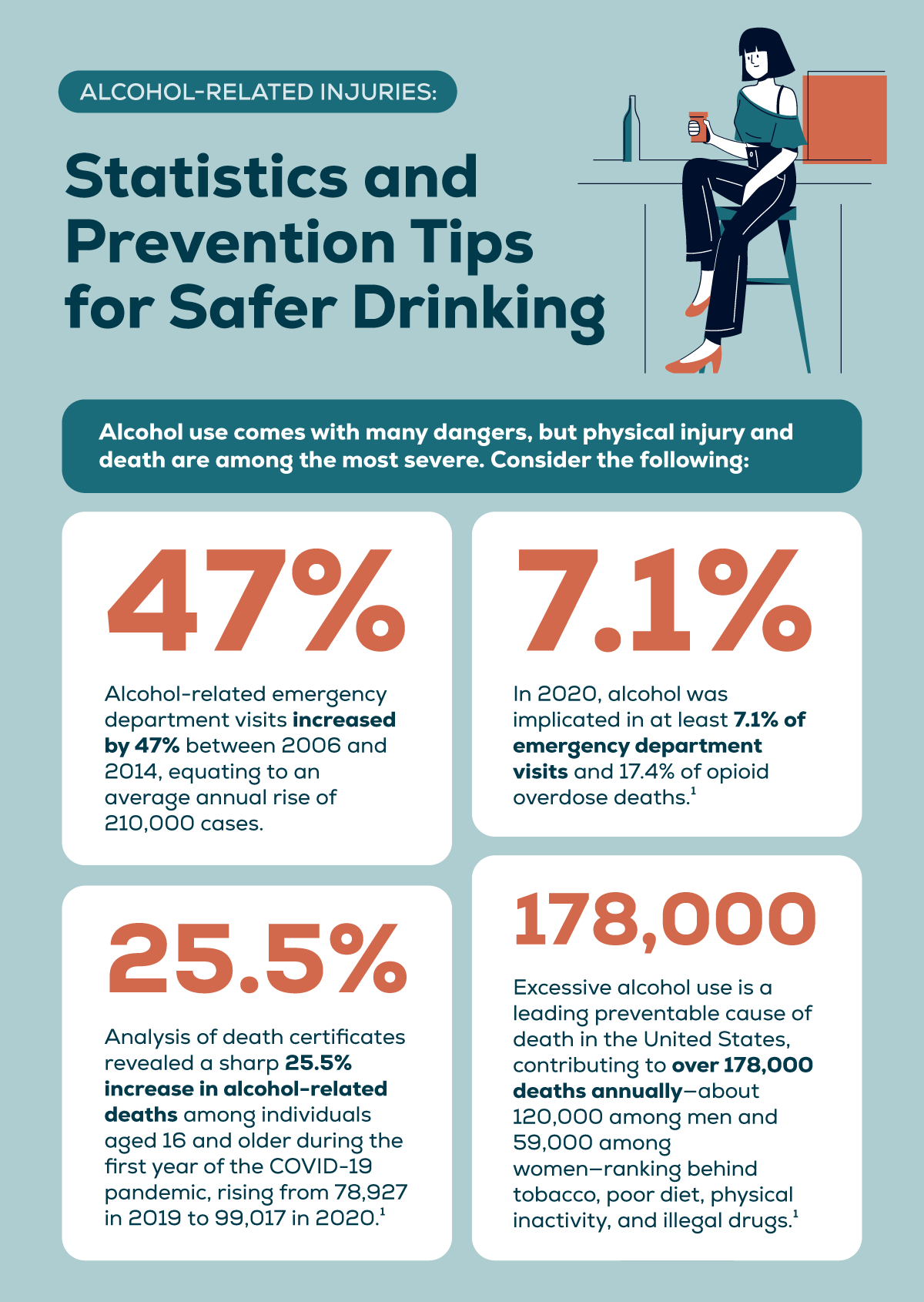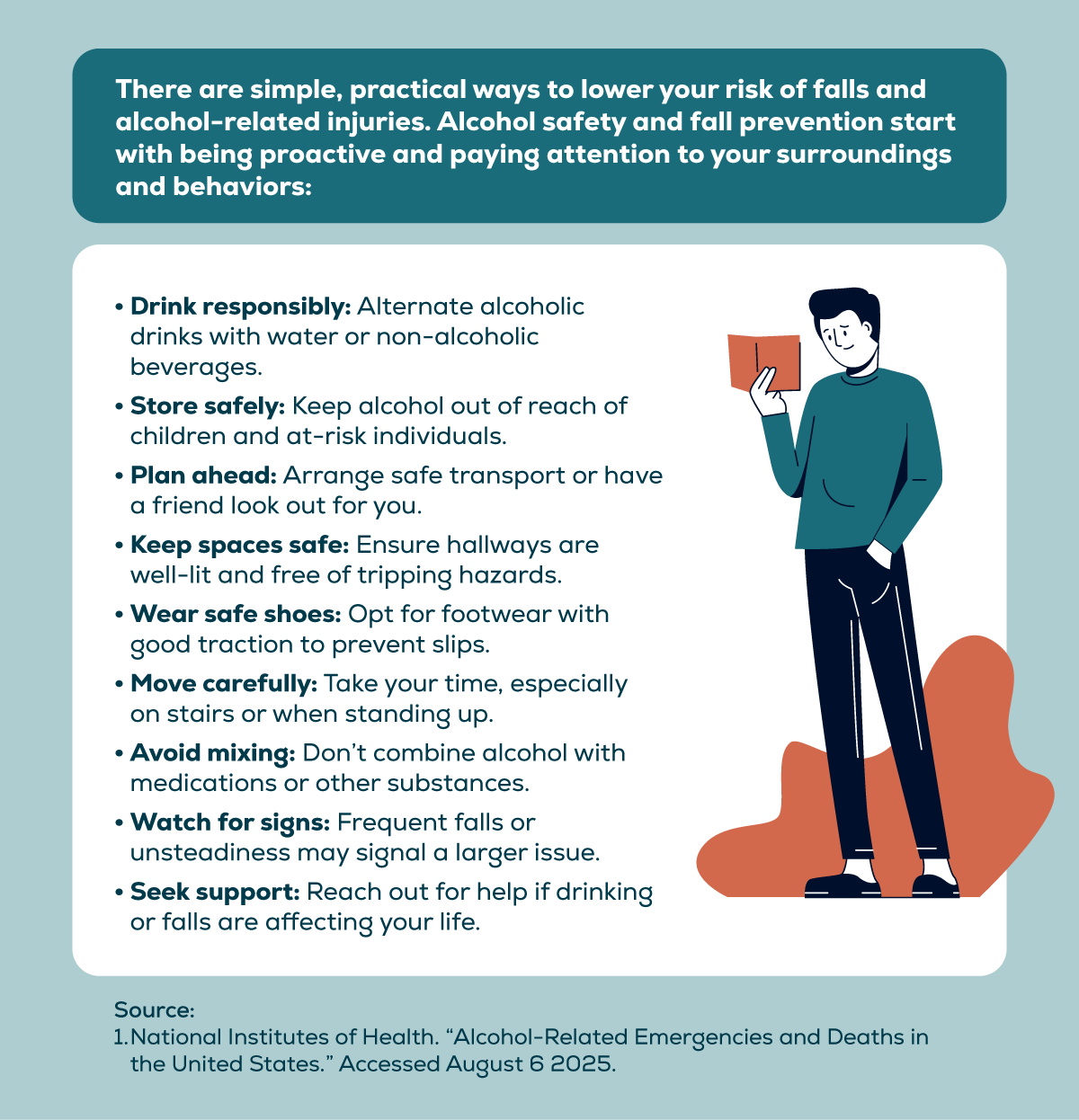Drinking alcohol can be a normal part of social life for many people, but it comes with risks that can impact your health and safety. One of the most serious and often overlooked dangers is falling when drunk. If you or someone you care about has experienced slips, trips, or even falls after drinking, you’re not alone—this is a common situation that affects people of all ages. Sometimes it may lead to just minor cuts or bruises, but in some cases, alcohol-related injuries can be severe, leading to broken bones, head injuries, or long-term health problems.
Understanding how alcohol and balance issues interact is an important first step in protecting yourself and your loved ones. At Promises Brazos Valley, we know how challenging it can be to deal with these concerns, and alcohol detox and rehab options can help. Our team is ready to support you and answer any questions you might have about the effects of alcohol consumption and staying safe. If you’re ready to make a change or want to learn more, contact our compassionate team for more information.
Alcohol and balance issues: Why falls happen when drinking
There’s a strong link between drinking and problems with balance and coordination. Many people have experienced at least a moment of clumsiness or dizziness after having a drink or two, but falling when drunk is more than just an accident. Alcohol changes the way your body and brain work together, making you more prone to losing your balance or tripping over something that usually wouldn’t be a problem.
People might not always realize how quickly alcohol can affect their physical coordination, even with just a small amount. Some common alcohol-related injuries from falls include sprains, broken wrists or ankles, concussions, or even serious head injuries. For older adults, alcohol and mobility issues are severe, as falls can mean long recovery times or complications.
Alcohol and coordination problems
Alcohol is what’s known as a central nervous system (CNS) depressant. This means it slows down how messages move between your brain and body. When you drink, your muscles don’t respond as quickly, your reflexes slow down, and you’re less steady on your feet. Even a short walk across a familiar room can become risky if you’ve been drinking. These alcohol and coordination problems can appear quickly, even after one or two drinks.
Alcohol and accident risk
Drinking alcohol also impacts your ability to think clearly and make safe decisions. You may take risks you wouldn’t normally consider, like climbing stairs, going outside in bad weather, or trying to carry heavy objects while impaired. As a result, alcohol and accident risk go up, and these choices can have long-term impacts on your physical health.
How alcohol impacts sleep and overall well-being
Another important consideration is how alcohol affects your sleep. Drinking may make people feel sleepy at first, but it can actually reduce the quality of sleep and make you more likely to feel tired or groggy the next day. Poor sleep increases the chances of balance issues, further contributing to the risk of falling when drunk.
Keeping alcohol consumption in check not only reduces immediate accident risk—it can also improve your sleep, mood, and overall physical health.
Other effects of alcohol consumption on your physical health
Alcohol doesn’t just affect your balance and coordination in the moment—it can have lasting effects on your muscles and nerves that may linger even when you’re not actively drinking. Over time, repeated falls or stumbles can lead to joint and back pain, muscle strains, or more serious alcohol-related injuries. These can reduce your ability to enjoy daily activities and make it harder to stay independent, especially as you age.
Alcohol and mobility issues
Individuals who experience frequent falls after drinking may start to feel anxious about going out or participating in activities with friends or family. This can lead to social isolation or depression, which makes recovery even more challenging. If you’ve noticed an increase in mobility issues after drinking, it’s essential to pay attention and take action to prevent further harm.
Alcohol-related injuries and health risks
Falling when drunk carries a real risk of serious injury. Alcohol-related injuries from falls may include:
- Broken bones (hips, wrists, ankles)
- Head injuries, including concussions or brain trauma
- Cuts and bruises
- Sprains or strains
- Internal injuries
For some, a single fall could mean weeks or months of recovery and may even lead to long-term or permanent changes in health. The alcohol and health risks associated with frequent falls are serious, and it’s essential to seek medical attention if you’ve been injured while drinking.
Alcohol-related injuries aren’t limited to falls at home. People may also get hurt when drinking in public places, at parties, or while engaging in outdoor activities. Different settings come with unique risks. For example, uneven sidewalks, crowded bars, or dim lighting make people more likely to trip or lose their balance after a drink or two.
It’s important to know your limits and have a plan for how to stay safe, no matter where you are. If you know you’ll be drinking, try to go with friends or family who can help look out for you.


Signs you may need help with alcohol abuse
Not everyone who drinks is at risk, but you may want to reach out for help if you notice certain warning signs. Some signs include:
- Falling when drunk more than once or twice
- Injuries after drinking that require medical attention
- Family or friends concerned about your drinking and safety
- Difficulty remembering what happened while drinking
- Trouble keeping up with work, school, or home responsibilities
Seeking support isn’t a sign of weakness—it’s a step toward wellness. There are many treatment options available, and you deserve to be safe, healthy, and comfortable in your daily life.
Frequently asked questions (FAQs) about alcohol and balance issues
What are the common causes of falling when drunk?
Falling when drunk often happens because alcohol affects both the brain and the body. It slows down your muscles, weakens your balance, and can cloud your judgment, making it much easier to trip, stumble, or lose your footing.
How does alcohol consumption affect balance and coordination?
Alcohol changes the way your brain sends messages to your muscles. This means slower reaction times, less muscle control, and a higher chance of losing balance—even after just a few drinks.
What are some effective strategies for preventing alcohol-related falls?
To help prevent falls and alcohol-related injuries, try drinking less, sticking to familiar spaces where you feel safe, wearing shoes with a good grip, keeping walkways clear, and being cautious around stairs or uneven surfaces.
What are the potential health risks associated with alcohol-related injuries?
The health risks from alcohol-related injuries include broken bones, head trauma, joint sprains, and internal injuries. For older adults, these injuries can be especially serious and may lead to more time in the hospital or long-term health issues.
How can one improve safety and reduce accident risks when consuming alcohol?
To improve safety, always know your limits, make a plan for getting home safely, avoid mixing alcohol with medicines or other substances, and reach out for help if managing your drinking becomes a struggle.
Connect with Promises Brazos Valley and get started on alcohol addiction treatment today
At Promises Brazos Valley, we believe everyone deserves to feel safe and supported as they work toward better health. If you’re worried about falling when drunk, struggling with alcohol and coordination problems, or have suffered alcohol-related injuries, it’s the right time to reach out. Our compassionate team is here to help you every step of your journey.
Choosing to get help is an act of strength and hope. Together, we can reduce the risks of alcohol and accident risk, support your physical and mental health, and help you live your life with greater confidence and security. Contact our team online or call 888.483.7851 for a confidential conversation about your needs. We’ll walk you through our alcohol detox and treatment options and provide advice on alcohol use issues, fall prevention, and safety tips that can make a difference.

